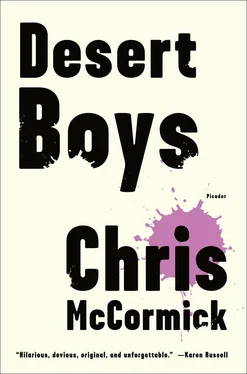XIV. THE TALLEST TREES IN THE ANTELOPE VALLEY
They still own the record. The tallest of the three clocks in at over fifty feet. You can see them from the 14, if you’re riding through the high desert: Three pineapple tops watching over everyone on the east side of town.
I ended up telling my dad one night about my involvement in their planting. He came to me after I’d snapped at my mother, and asked very seriously why we weren’t so close as we’d been when I was younger. The question was a simple one, and he said it with this grainy, soft voice like I’d never heard. We were in my bedroom. I sat on my bed, and he’d chosen to sit on the carpet. It’s amazing how powerful that memory is for me, a grown man sitting on the floor, asking for something he felt was important. He wanted to understand why things had changed. I didn’t have my complicated Pester/Foster analyses at hand, so I just said, “I don’t know.” Then I felt as though I owed him something more, so I told him the story.
“Don’t worry,” he said. “We’ll get you your money.”
But he wasn’t listening. It wasn’t about the money.
XV. THE LAST TIME I SAW MR. REUTER
He’d lost his hair. I hardly recognized him. I saw him only for a moment — I was coming into the house late one night, much later than my curfew. I was expecting a fight when I got home. And before I turned from the sidewalk toward my door, a light came on across the street. Mr. Reuter stood on a short stepladder, arms shaking above his bald, bespectacled head, installing what I found out later to be a motion-sensor light on the rim of his garage. I’d been under the impression, like others, that maybe he’d moved away. It was a shock to see him bald — it was a shock to see him.
This was a couple of years after the trees had been planted. In that time, rumors had spread that Mr. Reuter was ill and had spent the last of his money creating a living barrier between his house and the rest of the town in an attempt to die in peace.
I crossed Comstock Avenue that night. It must have been January because you could see ice gathering over the windshields of parked cars. He stood on that stepladder and I didn’t want to startle him. From a short distance, standing barely in the driveway, I asked if he needed help.
My mother’s brother Gaspar owned a scattering of apartments and trailer parks in Los Angeles County. His drinking — vodka, mostly, from a bottle with an Armenian label I should’ve learned to read by now — brought out the gossip in him. At my sister’s engagement party, before she and Patrick called off the wedding, Uncle Gaspar cornered me and shared a story that took place at one of his trailer parks, the one in my hometown. “My tenant,” he said, “a long time back. More of an employee, actually. Name was Phil. Told me ev-uh-ree-thing. ”
“I know Phil,” I said cheerfully. I was putting on that exaggerated enthusiasm you put on when someone you care about has had too much to drink and wants your attention for an unspecified amount of time. I said I knew Phil, but what I meant was this: When I was thirteen, this gangly white man who could pass for anything between twenty and forty occasionally accompanied Gaspar to my house. My uncle, who lived with all the other Armenians an hour away in Glendale, every now and then spent a weekend in the desert to check on his properties. Sundays he’d swing by our house on the way back to the city, and a few times — maybe a total of four or five Sunday evenings — he’d bring along this kid, this man, whose name I’d forgotten until my uncle breathed it, vodka-drenched, back into my life.
I began to remember how my uncle would sit on the floral sofa alongside my mother, and how Phil would settle into my father’s favorite red chair. As far as I can remember, my father and my sister were never home during one of these visits. It was always just the four of us, Phil and Gaspar and Mom and I, and all we did was talk and eat, eat and talk. One topic of discussion I remember was the unresolved election between Bush and Gore — Phil wanted to leave the country if one, I can’t remember which, came out the victor — which is how I knew these visits occurred when I was thirteen.
Phil’s baggy clothing underlined the gaunt, ghostly look he already had. He would shovel my mother’s cooking so belligerently into his bony face that he reminded me of a character in one of the novels I was reading at the time, a man who had been rescued many days after a shipwreck. As for me, my job was to get a fire going in the fireplace, and I’d kneel on the bricks, stuffing swaths of paper towels or newspaper or catalog pages into the nooks and crags of the logs. I’d strike a few matches until the fire finally caught and the smell of woodsmoke filled the house. I’d brush the soot from my pants and wash my hands. Then I’d collect my payment, a small dish of desserts my mother had baked and arranged for our guests — one or two honey-dripping pieces of rolled baklava, maybe, or a few powdered khurabia cookies — and sit on the hardwood floor, devouring the sweets and watching the fire I’d made consume everything and anything I allowed it to.
That Uncle Gaspar had forgotten I’d met Phil — on numerous occasions — didn’t surprise me. Those visits happened, after all, a long time ago. Plus, Gaspar had just tried to light the filtered end of his cigarette. I knew then he would tell me the truth. This far down the bottle, he couldn’t invent a story to save his life.
* * *
Not often, my uncle said, but sometimes, a person would ask Phil what it was that he did. And by that they usually meant, how do you make your money, how is it that you earn a living. His response wouldn’t exactly fill him with pride: hired help, here and there, painting houses or else moving lumber with Jim, most of the time out of work. “You’re only twenty-one,” Jim reminded him. In fact, Jim had been reminding Phil of his age with the word “only” in front of it for years — only seventeen, only eighteen, and so on. Phil wondered how much longer the word “only” would apply. But for now, he supposed it was true. He was only twenty-one. So despite the fact he hadn’t offered as meaningful an answer as he’d have liked, the question — what do you do? — didn’t tug at him too bad.
What helped was that he had something in the works — a project, a big one. He was collecting old VW buses. So far he had six, all of them incapable of running, all of them rotting with thirty years’ worth of rust and dust and backseat lust. That line — that was Jim’s.
Phil found the first bus abandoned in the desert, out on the northeast edge of the Antelope Valley. From time to time, Jim took him out there, far enough from law enforcement to shoot the rifles and pistols he collected. Jim Durant, a hardworking but carefree man double the twenty-one-year-old’s size, was someone Phil felt lucky to have on his side. It was Jim who’d let Phil tag along on jobs, and it was Jim, too, who had talked the trailer park manager — Uncle Gaspar — into letting Phil shack up there when he needed the help. Jim might have been “only” a decade older than Phil, but these acts of kindness and the faint, final wisps of hair that clung to the top of the big man’s scalp seemed to give him a type of paternal authority Phil hadn’t sensed from anyone. Sometimes Phil saw him like an old Southern politician, wagging a finger at bureaucracy, making sure of certain things, like, no one takes care of your business but you. Like, being given a hand up from a friend is different than getting a handout from a program.
So they’d go out to the nearby desert and shoot together. But this one time, Jim loaded his favorite rifle, a.44 magnum Marlin 1894SS, into the covered bed of his Chevy pickup. The gun shot at about 165 decibels — too loud even for their regular shooting grounds. So they went out farther into the desert. Jim drove — careful, once they’d left the road, to avoid the softer sand that collected in patches around that time of year, in May.
Читать дальше












